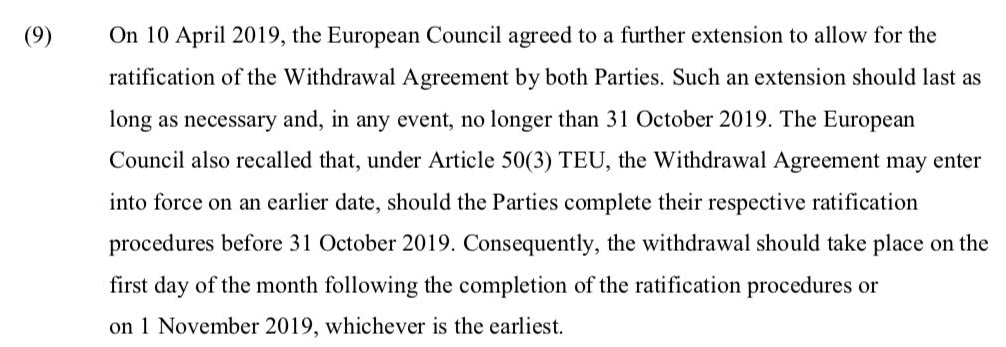Once again, Brexit dominates the political stage, so this month we focus on very recent events to bring you a top-of-the-bill Brexit update.
Brexit Update
You’re no doubt aware that the UK did not leave the EU on the 29th March, so-called ‘Brexit Day’ but instead received an extension until yesterday, 12th April 2019. Following recent events, the UK didn’t leave the EU yesterday either.
On Thursday morning, following six-hours of talks, and just in time for the Parliamentary Easter recess, the EU announced that, on 10th April, they offered an Article 50 extension, since aptly named the “Halloween Extension”, until 31st October. Here is the change in EU law;

The EU legislation also included a second clause, rather unfortunately being doffed the ‘flextension’.

Theresa May accepted both the ‘Halloween Extension’ and the ‘flextension’ by letter to the EU:

About the article 50 extension, Donald Tusk, the European Council president, said:
“During this time, what happens will be in the hands of the UK. It can ratify the withdrawal agreement, and leave. It can change strategy, although not the withdrawal agreement. Or it can decide to revoke and cancel Brexit altogether.”
At an early morning press conference announcing the decision, Theresa May reiterated her commitment to making sure the UK leaves the EU with a deal as soon as possible, and concluded with;
“Let me conclude by saying this.
I know that there is huge frustration from many people that I had to request this extension. The UK should have left the EU by now and I sincerely regret the fact that I have not yet been able to persuade parliament to approve a deal which would allow the UK to leave in a smooth and orderly way.
But the choices we now face are stark and the timetable is clear.
So we must now press on at pace with our efforts to reach a consensus on a deal that is in the national interest.
Tomorrow I will be making a statement to the House of Commons.
Further talks will also take place between the government and the opposition to seek a way forward.
I do not pretend the next few weeks will be easy or that there is a simple way to break the deadlock in Parliament.
But we have a duty as politicians to find a way to fulfil the democratic decision of the Referendum, deliver Brexit and move our country forward.
Nothing is more pressing or more vital.”
Yesterday afternoon, Theresa May gave her statement in the House of Commons to a mixed reception and subsequent debate that ended with the Prime Minister, in light of the looming Easter recess, proclaiming that it would be good for all ministers to reflect on what happens next away from the chamber.
Yesterday Nicola Sturgeon, Scotland’s First Minister tweeted:
“It is a relief that – thanks to the patience of the EU – we will not be crashing out tomorrow. But the UK must not waste this time – allowing people to decide if they still want to leave is now imperative. And Scotland’s interests must be protected.”
She later followed that tweet with an open letter to the UK Prime Minister in which she intimated that she is now ready to set out plans to Scottish Parliament for a second independence referendum. Here is an extract:
“We now have the gift of more time from the EU, and that must be used constructively to re-set the UK government approach. Your ongoing talks with the leader of the opposition should now broaden to include other parties, the devolved administrations, business and civic society, and open up the range of options on the table in an effort to reach a genuine consensus. If such talks are to stand any chance of success you must be prepared to recognise in particular that it is essential for Scotland, at the very least, to stay inside the single market and continue to benefit from freedom of movement.”
Even President Trump got in on the Brexit act in the early hours of yesterday morning with a somewhat bewildering criticism of the EU for being tough on Brexit and the UK when he tweeted:
“Too bad that the European Union is being so tough on the United Kingdom and Brexit. The E.U. is likewise a brutal trading partner with the United States, which will change. Sometimes in life you have to let people breathe before it all comes back to bite you!”
Parliament will reconvene on 23rd April and interestingly, although perhaps not unsurprisingly, the business announced for the first week after Easter does not include any indicative Brexit votes.
In Conclusion
While the talking heads will no doubt keep on talking to fill the void left as Parliament enters the Easter recess, there will likely be no movement on any of these matters until the UK and Scottish parliaments return later this month.
We still don’t know what the future holds; there is no certainty around whether the UK will or will not leave the EU, and an uncertain prospect of a second Scottish referendum to consider divorcing from the UK further seeks to rock the status quo.
While the deepening of the Brexit crisis was generally ignored by equity investors last month, and UK shares performed well in March compared with their EU counterparts, the long term economic and financial effects remain to be seen.
And In Other News…
World Equity Markets
While the overall trend has been sideways movement and volatility, March saw most equity markets record gains.
All major markets besides Japan gave positive returns on the month, favouring growth stocks over value plays. Emerging markets again saw the most extreme movements, with Zimbabwe and India providing the low and high markers for the month.
Among emerging markets, Asia fared better than South America or Europe, with China and Russia showing respectable gains, while the US benefited from a tech stock rally, with the NASDAQ Index up 2.6%.
European Equity Markets
European Equities were sharply divided in March, with emerging markets faring poorly, led by Turkey and Romania losing 13% and 14.1% respectively. Turkey continued to suffer from a falling currency and restricted Lira liquidity, pushing overnight rates to 1200% at one point.
Developed markets by and large returned gains, with Denmark rising 5%, followed by strong showings from Italy, Sweden and the UK. Weak economic data continued to plague the EU, although this was not reflected in stock market returns as Italy, currently in recession, was one of the best performers.
EU share prices defy weak economic data
Market performances within the EU were diverse, as emerging markets returned mostly losses over the month while major markets shrugged off poor economic data to show mostly positive returns. The Nordics again provided some of the best monthly returns while Italy, already in recession, managed a 3.5% gain.
Sterling loses ground against world currencies
Continuing its recent volatility, Sterling gave back some of its gains from past months, while the Dollar and Yen both benefited from investor nervousness, attracting money flows as safe havens during market turbulence.
Chinese stimulus continues
Chinese stimulus efforts continued during the 13th People’s Congress in Beijing early in the month. China set a 2019 growth target at recently reported levels of between 6 and 6.5% and announced additional tax cuts of 2trn RMB, roughly 2.0% of GDP, focussed on reducing value-added and personal income taxes.
Emerging markets stall on global growth fears
Overall, emerging markets were flat in March, as measured by the Sterling MSCI Emerging Markets Index, and underperformed their developed market counterparts as investors became nervous about the global growth outlook. South America and Europe were noticeably poorer performers, while Asian economies, led by India and China, generally fared better.
Investors seek safety in global bonds
Bonds rallied globally in March, driven by increasing investor fears around global growth, poor economic data from the EU, and a more dovish tone from the US Fed. Longer-dated government bonds, particularly index-linked issues, led fixed income markets higher with more sovereign bonds moving into negative yield territory.




